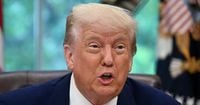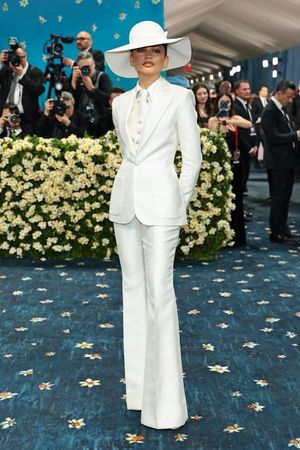In a light-hearted moment during a press conference on Thursday, May 8, 2025, President Donald Trump attempted an impression of the late actor Sean Connery while discussing the implications of U.S. tariffs on the United Kingdom's film industry. The president's remarks came in the wake of a historic trade deal between the U.S. and the UK that aims to reduce tariffs on British goods, including automobiles and steel.
Trump, speaking from the Oval Office alongside UK Prime Minister Sir Keir Starmer, insisted that "James Bond has nothing to worry about that" regarding the newly negotiated tariffs. His comments were met with laughter from the assembled press corps, highlighting the quirky intersection of politics and pop culture.
During the briefing, Trump recounted an anecdote about Connery, who famously portrayed the iconic British spy James Bond. "You know, Sean Connery was a friend of mine. He was responsible for my getting zoning in Aberdeen. He said, 'Let the bloody bloke build his golf courses,'" Trump said, mimicking Connery's voice in a mock impression that drew chuckles from the audience. The anecdote underscored the president's long-standing connection to the actor, who had previously supported Trump's golf course projects in Scotland.
The trade deal, which Trump described as "full and comprehensive," is particularly significant as it marks the first major trade agreement the president has secured since implementing his controversial Liberation Day tariffs. The agreement will slash tariffs on British cars, including the famed Aston Martin, to 10% for the first 100,000 exported to the U.S., a notable reduction from the previous rate of 25% imposed on other foreign vehicles.
"This is a great deal for both countries," Trump declared confidently, adding, "Every country wants to make a deal." The announcement coincided with the 80th anniversary of the end of World War II, a symbolic moment that both leaders acknowledged during their remarks. Starmer expressed gratitude for Trump's leadership and the efforts of his negotiating team, emphasizing the importance of the deal in strengthening U.S.-UK relations.
However, while the reduction in tariffs on cars was celebrated, Trump hinted at ongoing discussions regarding potential tariffs on foreign films, which could reach as high as 100%. He stated, "We’re going to have a discussion on that, separately," leaving the future of film tariffs uncertain.
The president's comments about Connery and the trade deal have sparked conversations about the intertwining of cultural icons and international trade policies. Trump's relationship with Connery, who passed away in 2020, has been characterized as supportive, particularly regarding Trump's golf course developments in Scotland. The president faced significant opposition from environmental groups during the approval process for his courses, particularly in Aberdeen, where concerns about sewage pollution and dune preservation were raised.
In light of the new trade deal, Trump took to his social media platform, Truth Social, to tease the announcement ahead of time. He wrote, "Big News Conference tomorrow morning at 10:00 A.M., The Oval Office, concerning a MAJOR TRADE DEAL WITH REPRESENTATIVES OF A BIG, AND HIGHLY RESPECTED, COUNTRY. THE FIRST OF MANY!!!" In subsequent posts, he expressed optimism about the deal, stating it would be a "very big and exciting day for the United States of America and the United Kingdom" and would help "cement the relationship" between the two nations.
As the trade deal unfolds, the implications for both countries remain to be seen, particularly in the context of the broader global economy. Trump's administration has been known for its unconventional approach to trade, often characterized by high tariffs and aggressive negotiation tactics. The reduction in tariffs on British cars is a significant shift, potentially easing tensions and fostering goodwill between the U.S. and its allies.
Meanwhile, the film industry is left to ponder the potential impact of future tariffs on foreign films. Trump's comments about James Bond, a character synonymous with British culture, serve as a reminder of the delicate balance between commerce and cultural identity in international relations.
As the dust settles on this latest announcement, both Trump and Starmer appear eager to capitalize on the momentum generated by the trade deal, hoping to strengthen ties and stimulate economic growth. The coming weeks may reveal more about the specifics of the agreement and how it will affect various industries on both sides of the Atlantic.
In a world increasingly defined by global trade dynamics, the intersection of politics, culture, and commerce continues to shape the relationships between nations. The U.S.-UK trade deal is just one chapter in a larger narrative that reflects the complexities of modern diplomacy.




